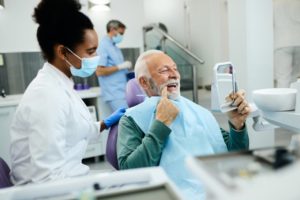
When you have opportunities to make upgrades in life, it’s wise to learn more about the potential improvement. You may have been doing fine with dentures in recent years, but you recently discovered dental implants in Lincoln and their many benefits. To follow up on your interest, it makes sense to find out what the transition from dentures would entail. Keep reading to learn about factors in the change from your implant dentist.
What Factors into the Decision to Switch to Dental Implants?
Finding out how your day-to-day life will change for the better can be encouraging. Dental implants will not slip around in your mouth or feel like they may fall out at any moment. Food won’t get trapped in your implants and no more dealing with sore gums or raw spots.
Feel free to eat all the foods you like – even the ones that are difficult to bite into or have little seeds. Clean your implants like natural teeth, no more bothering with denture adhesive or soaking them in a glass of water. Dentures are certainly much better than having no teeth, but now you are taking a step up. Get ready to feel like you have permanent teeth again.
Why Would Someone Not Be a Candidate for Dental Implants?
Your dentist will definitely examine the density of your jawbone early in the process. When your teeth are removed from your gums and jaw and are not replaced with anything, your jawbone begins to shrink. It can change the shape of your face, but also make getting dental implants a longer process.
You won’t have a successful implant procedure if you don’t have enough bone, so the dentist will determine if a bone graft is necessary. If so, you’ll need 4-6 months of recovery for the new bone to fuse to your current bone in advance of the implant procedure.
What Is Important to Know Before Getting Dental Implants?
Because the implants need to fuse to your jawbone, you can expect to have minor oral surgery. Once the implants have been placed, you will need to stay on a soft foods diet temporarily to let them heal. This usually takes 3-6 months while the bone grows to fuse the implant screws to your jawbone.
It will be essential during this time to avoid placing excess strain on the implants, so they do not shift or heal crookedly. When they have successfully fused to the jawbone, your dentist will clear you to return to your normal diet. As far as day-to-day care, you’ll return to the regimen you used when you had natural teeth with brushing and flossing. When flossing, it will be important to clean around the areas where each dental crown and implant connect.
You still have questions in need of answers, and fortunately, that’s what the consultation with your dentist is for. Just keep the big picture in mind – the surgery and recovery in the short term will pay off when you transition to the best alternative to natural teeth for many years to come with dental implants in Lincoln.
About the Author
Dr. Louis Olberding has been working hard for the Lincoln community and surrounding areas for nearly two decades. Earning his Doctor of Dental Surgery from the University of Nebraska Medical Center, he continues to prioritize learning and is one of two dentists in Nebraska to hold the prestigious position of Spear Visiting Faculty. If you are interested in dental implants in Lincoln, Dr. Olberding is a Fellow of the International Congress of Oral Implantologists and flexible payment options are available. You can schedule a consultation on his website or by calling (402) 488-2325.
